Developing an app like Coursera, a popular online education platform, involves a complex process and substantial investment. With features such as course management, video streaming, interactive assessments, user profiles, and payment systems, building such a platform requires significant technical expertise and resources.
The cost to develop an elearning app like coursera can depend on the app’s scale, functionality, and the development team’s location and many other factors.
In this blog, we’ll break down the factors influencing the cost of building an e-learning platform, providing a detailed overview of pricing expectations and critical considerations for creating a successful online learning app like coursera.
The global Massive Open Online Course (MOOC) market is poised to reach a valuation of approximately $10 billion in 2023, with projections indicating it will grow to $48.4 billion by 2033, reflecting a robust compound annual growth rate (CAGR) of 16.2%. Several key factors are driving this growth:
Over the past decade, the increasing adoption of digital technologies has significantly boosted the demand for MOOCs, making education more accessible and flexible.
The growing availability of language courses, affordable pricing, free demo classes, and special attendance tracking features are contributing to the widespread adoption of MOOCs.
Students’ increasing preference for digital learning platforms that offer personalized education experiences drives the shift towards MOOCs, which allow for tailored learning paths.
The growing need for enhanced learning outcomes, productivity, and flexibility in education is accelerating the demand for MOOCs among learners of all ages.
The integration of tools such as Microsoft Teams, Zoom, and Google Meet has made it easier for students to connect with educators, further enhancing the appeal of MOOCs as a valuable educational resource.
The pandemic-induced shift to remote learning, alongside the necessity of maintaining social distancing, significantly accelerated the adoption of MOOCs, leading to a surge in market growth.

Coursera is one of the leading online learning platforms that partners with universities and organizations to provide online courses, specializations, and degrees. It was founded in 2012 by Stanford professors Daphne Koller and Andrew Ng. Coursera quickly gained popularity for its vast selection of courses covering everything from data science and artificial intelligence to humanities and personal development and the factors to cost to develop an eLearning app like coursera.
Read More: How to develop eLearning app like Udemy?
The global online education market is expanding rapidly, and educational apps are at the forefront of this trend. Here is a brief explanation of it:
Many educational apps operate on a subscription model, where users pay monthly or annually for access to premium content. This model provides a steady stream of revenue.
Some apps offer free essential content while charging for advanced features, certifications, or premium courses.
Educational apps often partner with companies to offer tailored training solutions for employees. These B2B partnerships can be lucrative.
For platforms like Coursera, offering certificates and full degrees adds a revenue stream.
The COVID-19 pandemic accelerated the adoption of online learning, making it a permanent fixture in the educational landscape.
AI-powered learning tools, gamification, and personalized learning experiences make educational apps more appealing to users.
Businesses invest in employee development through online courses, increasing the demand for learning platforms.
With the right business model and value proposition, educational apps can be highly profitable and can also impact the Coursera plus price.
Read More: Top learning trends to watch out in 2024
While Coursera is a leader in online learning, several other platforms offer similar services, each with unique features. Here are five top app similar to coursera:
Udemy is a global marketplace for learning and teaching online. Unlike Coursera, which primarily partners with universities, Udemy allows anyone to create and sell a course.
Key Features:
Harvard and MIT founded edX, a non-profit platform that offers high-quality courses from top universities and institutions worldwide. It offers a wide range of free classes and the option to purchase certificates.
Key Features:
LinkedIn Learning (formerly Lynda.com) offers courses aimed at helping professionals improve their skills and advance their careers.
Key Features:
Skillshare is a creative community that offers courses in art, design, photography, and other creative fields.
Key Features:
FutureLearn is a UK-based platform that offers courses, micro-credentials, and degree programs in partnership with universities and cultural institutions.
Key Features:
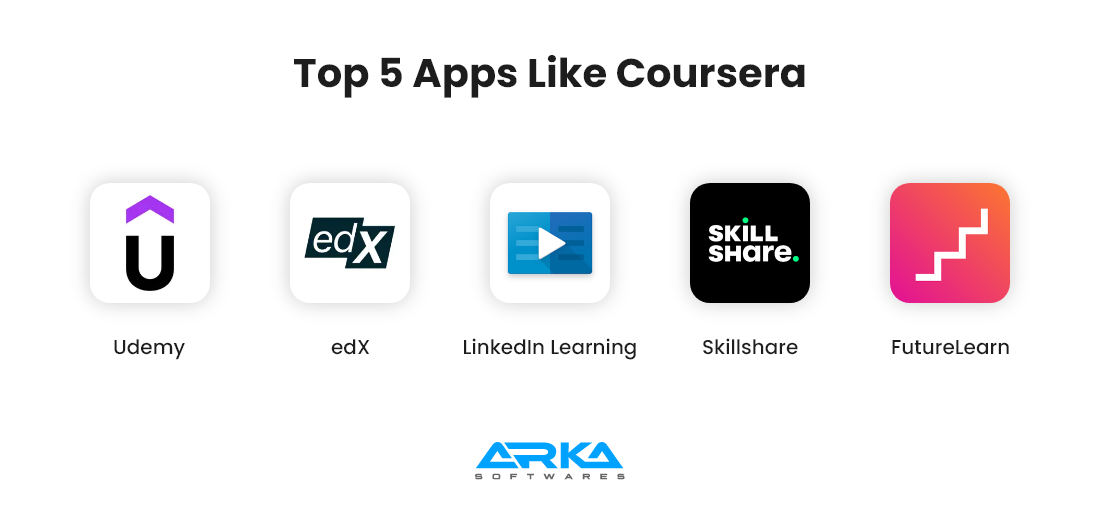
As mentioned below is, the Coursera app development process explained in detail:
Start by clearly defining the purpose of your educational app. Who is your target audience? Are you focusing on students, professionals, or corporate training?
What type of courses will you offer—general knowledge, niche skills, or specialized professional certifications? Identifying your niche and understanding your audience will help shape the app’s content, features, and design.
Conduct thorough market research to understand your competition—study platforms like Coursera, Udemy, and edX to identify their strengths and weaknesses. Understand what features users love and where competitors fall short.
This research will help you develop a unique value proposition and identify gaps in the market that your app can fill.
Based on your goals and research, define the core features of your app. Essential features for an app like Coursera include:
Select the technology stack that will support your app’s development and scalability. You’ll need a combination of frontend and backend technologies, databases, cloud services, and video streaming capabilities. For example:
Design a user-friendly and engaging interface that prioritizes ease of navigation and accessibility. A clean, minimal design with easy access to courses and learning materials will enhance the user experience.
Given the increasing demand for mobile learning, consider designing a mobile-first experience. The goal is to ensure users can navigate the app seamlessly, whether on mobile or desktop devices.
With your design and features in place, the development process begins. Start with front-end and back-end development, building out the user interface, databases, and core functionality.
Use agile development practices to iterate on the app, releasing regular updates and getting feedback from testers. Ensure that the app is responsive, fast, and user-friendly across devices.
Testing is crucial to ensure your app is bug-free and performs optimally. Conduct thorough quality assurance (QA) testing to identify and fix features, security, performance, and compatibility issues.
This includes usability, stress, and functional testing to ensure that the app meets user expectations.
Once the app is tested and ready, launch it in stages. Start with a beta version to gather feedback from early adopters and fix any remaining issues before the full launch.
Promote the app to your target audience through digital marketing, social media, and partnerships with influencers or educational institutions.
Choose a monetization model that fits your goals, such as subscription fees, pay-per-course, or freemium with premium content, to make your app financially sustainable.
As your app grows, scale your infrastructure to handle increasing users and data. You can continue optimizing your marketing efforts to attract a larger user base and expand your course offerings.
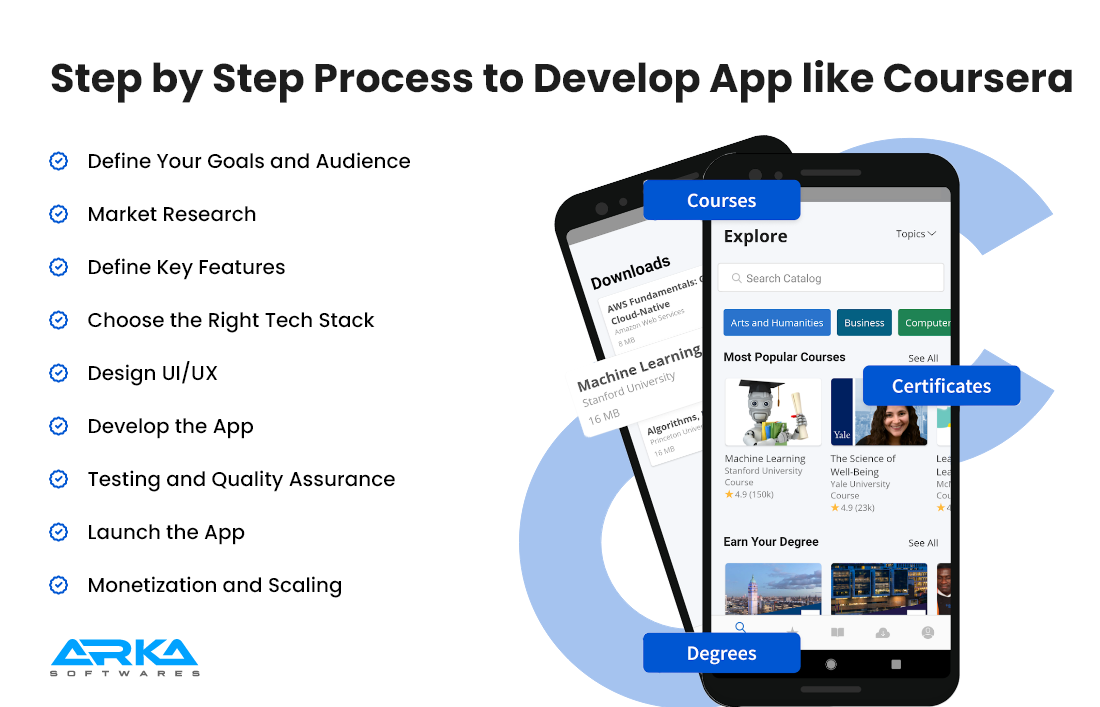
Developing a successful eLearning app involves much more than offering a list of courses. To provide a seamless, engaging learning experience, here are some coursera app features that can make your app stand out. Whether you’re aiming to develop an app like Coursera or create a platform tailored to a specific niche, these features will help enhance user engagement, retention, and overall satisfaction.
Allow learners to track their progress, achievements, and course completion status. A personalized dashboard improves engagement and motivation by showing learners where they stand in their courses and what milestones they’ve achieved.
If you plan to create an app like Coursera, this feature is crucial for providing a custom experience that keeps learners coming back.
Incorporate multimedia content like videos, quizzes, assignments, and interactive simulations to make learning engaging and dynamic. A traditional text-based course is often less effective than one that integrates a variety of media formats.
If your goal is to make app like Coursera, rich multimedia elements are essential to enhance the learning experience and provide depth to each course.
Include features such as badges, leaderboards, and rewards to encourage users to complete courses and stay motivated. Gamification is a powerful tool to drive user engagement by making learning more fun and rewarding.
When learners achieve a milestone, they earn badges or points, which creates a sense of accomplishment and pushes them to continue.
Allow learners to interact with instructors and fellow students through live chats, discussion forums, and video calls. Real-time communication fosters community and enables learners to ask questions, discuss topics, and share insights.
To create app like Coursera, integrating real-time communication tools will elevate the learning experience and encourage user interaction.
Ensure the app is mobile-friendly, as many users prefer learning online. In today’s fast-paced world, people want to learn while commuting, traveling, or during downtime.
A mobile-first approach increases user engagement and boosts course completion rates, as learners can easily continue their lessons even when away from their desktops.
Allow users to download courses and materials to continue learning without an internet connection. This feature is precious for learners in regions with unstable internet connectivity or those who prefer to study in offline environments.
To make app like Coursera, offline capabilities should be considered as a critical feature for improving user satisfaction and accessibility.

Provide users a secure and easy way to purchase courses, certifications, or subscriptions within the app. Payment gateway integration ensures that transactions are smooth, safe, and reliable, which is crucial for building trust with your users.
As you develop an app like Coursera, integrating popular payment options like PayPal, Stripe, or credit card systems should be a priority.
Use machine learning to offer personalized course recommendations based on the user’s progress, interests, and career goals. Personalization enhances the user experience by providing learners with content tailored to their unique needs and aspirations.
If you plan to create app like Coursera, AI-powered recommendations will add value by helping users discover courses relevant to their career or personal development.
Provide administrators with a backend dashboard to manage courses, users, payments, and analytics. A comprehensive admin panel is also necessary to ensure the platform operates smoothly and efficiently.
For any platform you intend to make app like Coursera, the admin panel should offer advanced features for seamlessly managing content, payments, and user interactions.
Offer content in multiple languages to cater to a global audience. As online learning reaches across borders, providing multi-language support will allow you to tap into new markets and increase your user base.
Whether you aim to offer courses in English, Spanish, French, or other languages, this feature helps your app cater to a diverse demographic.
Read More: Top 20 education apps for online learning
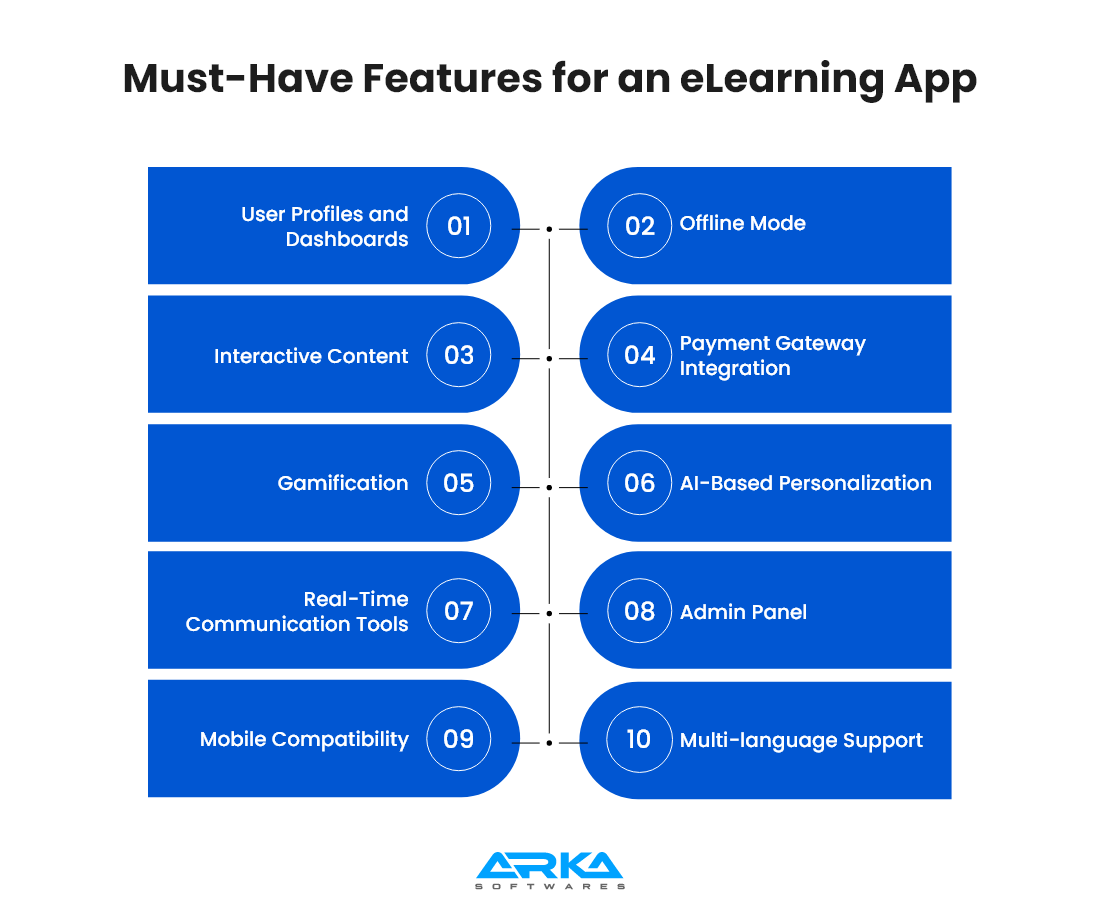
The Coursera eLearning app relies on a robust technology stack to support millions of users and large-scale course delivery. By leveraging React Native app development services, businesses can accelerate their iOS and Android launches while maintaining native-like performance.
Here’s a look at the technologies that power this platform and impact the cost to develop an eLearning app like coursera:
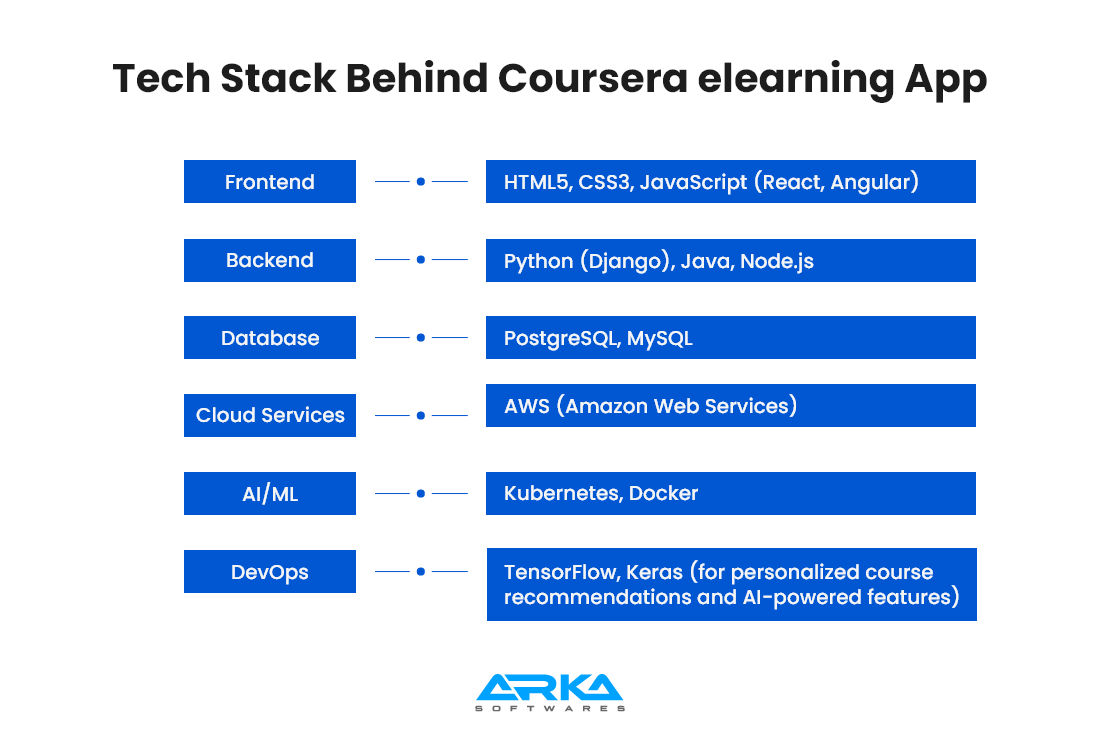
Building an educational app like Coursera involves significant investment, depending on the app’s complexity, features, and development timelines. On average, the development cost for an eLearning app can range from $12000 to $25000.
The Coursera app development cost will largely depend on the specific functionalities and platforms you want to target.
The app like Coursera development cost will vary depending on the platform you choose (native vs. web-based), the number of features, and the level of customization needed.
After the initial launch, regular updates, bug fixes, and feature enhancements are necessary to keep the app running smoothly, adding to the Coursera app development cost over time.
The cost drivers for building eLearning app like Coursera is mentioned below:
Building the core platform involves both frontend (user interface) and backend (server-side) development.
Frontend development focuses on creating an intuitive and engaging experience for users, while backend development ensures the app functions seamlessly, with secure user authentication, content management, and data storage.
The tech infrastructure includes cloud hosting, servers, storage, and content delivery networks (CDN). A cloud service like AWS or Google Cloud is often used for scalable hosting and storage solutions to handle large video files and traffic.
Designing a user-friendly interface and ensuring a positive user experience (UX) is key to the success of any app. This includes visual design, navigation, accessibility, and overall usability. Good UX reduces user churn and enhances engagement, which can require hiring skilled UI/UX designers.
Once the app is live, ongoing maintenance is needed to ensure it continues to run smoothly. This includes bug fixes, performance optimizations, and regular updates to keep the platform fresh and in line with user expectations.
Advanced features such as AI-based recommendations, video streaming, and real-time communication tools increase development time and cost. These features, commonly found in apps like Coursera, require a solid technical foundation and higher development expertise, thus driving up the app like Coursera development cost.
The location of your development team affects the cost. For example, U.S. or Western European developers may charge significantly more than those in Eastern Europe or India. While the quality of work varies by region, outsourcing to a location with lower hourly rates can significantly reduce the overall Coursera app development cost.
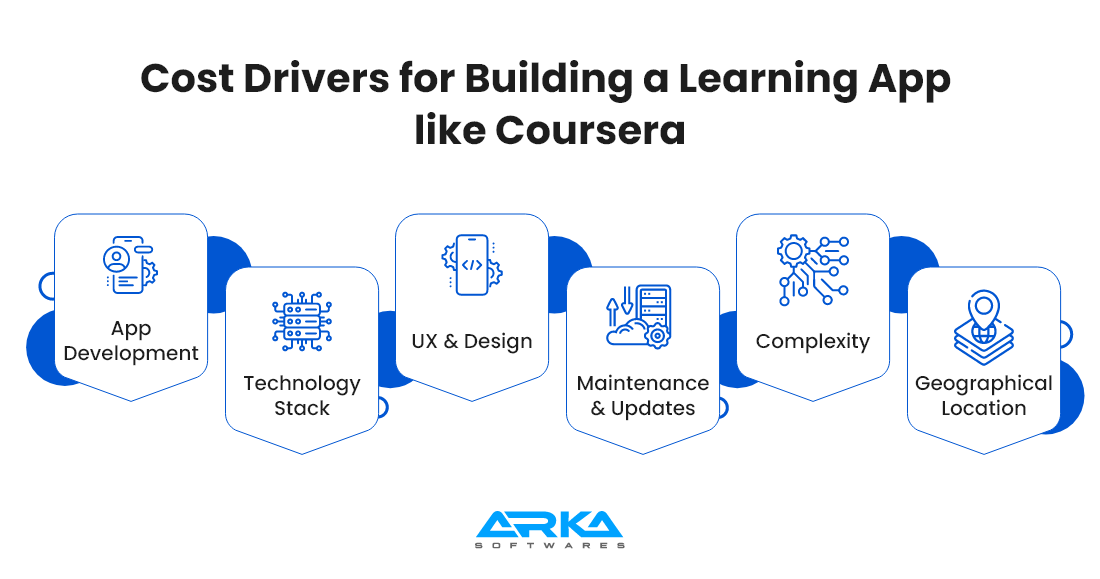
Below are some of the monetization models that work for apps similar to Coursera. Educational apps can generate revenue through several monetization models:
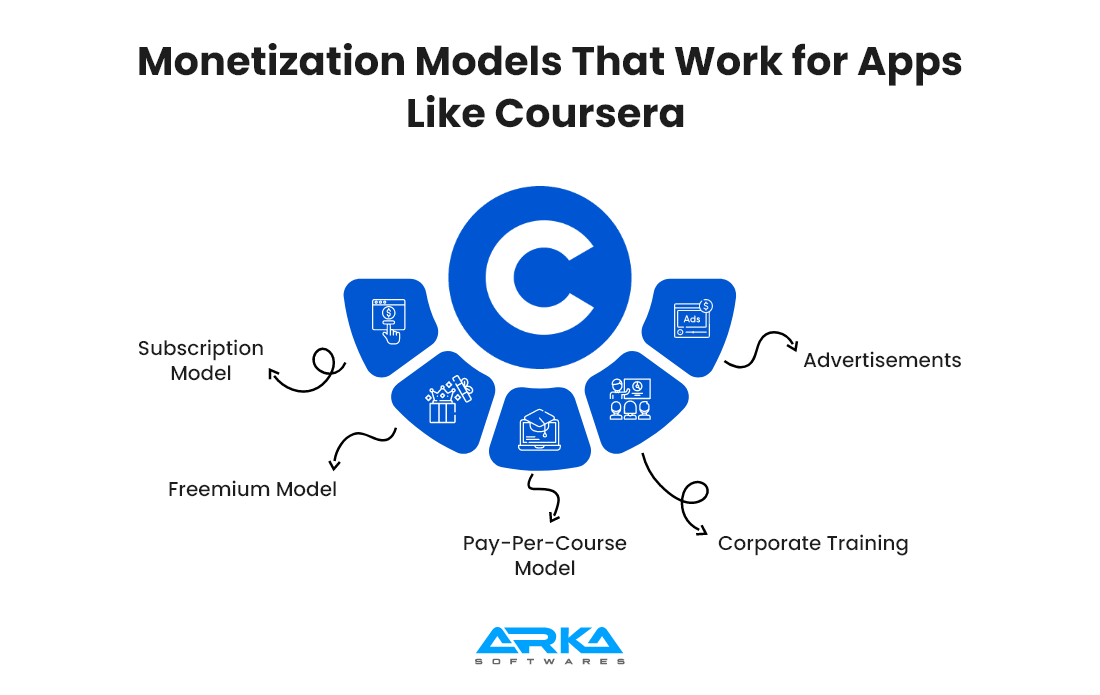
If you’re interested in developing an eLearning platform like Coursera, it’s essential to choose a skilled development team with experience in building educational apps.
Arka softwares as elearning app development company specializes in creating user-friendly, feature-rich eLearning solutions that cater to diverse learning needs. Our team is proficient in all stages of app development, from ideation and design to development and post-launch support to create custom eLearning App with ease and profitability.
Read More: Benefits of using elearning in African countries
Online education is here to stay, and platforms like Coursera have paved the way for the growth of the eLearning industry.
Whether you’re interested in learning new skills or developing your own educational app, understanding the market, technology, and monetization strategies is essential even for coursera android app development process and more.
Developing an app like Coursera requires a clear vision, a solid tech stack, and a deep understanding of user needs. But with the right strategy and execution, it can be an incredibly rewarding endeavor.
If you’re ready to take the leap into the world of online education, the opportunities are limitless with eLearning app like Coursera.
Building an eLearning app like Coursera involves several key steps. First, you need to define the core features such as course creation, video streaming, quizzes, certificates, and user management. You will need to integrate video hosting and streaming services, possibly using platforms like AWS or Google Cloud.
Building an educational app like Coursera involves significant investment, depending on various factors such as app complexity, features, and development timelines. On average, the development cost for an eLearning app can range from $12000-$25000.
The development time for an app like Coursera can vary depending on its complexity and the size of the development team. Typically, it can take anywhere from 6 to 12 months to build an e-learning platform.